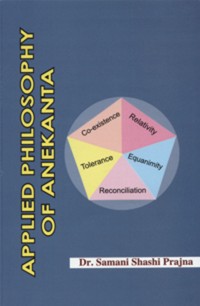Any comparative study in the field of philosophy uses the tool-box method of Wittgenstein's 'Family Resemblance' i.e. which looks to the ideas of 'overlappings' among the various systems of philosophy. The efforts are being made to highlight the points of agreement as well as difference between some of the concepts of Jaina philosophy and that of Sartrean philosophy. Jean Paul Sartre (1905-1980), is considered to be an 'Existential Phenomenologist' in the world of Western Philosophy. Though Jain philosophy is an ancient philosophy, it is very scientific, analytic and modern which coincides with the views of modern western philosophical thinking.
Nature of Soul and Being-for-itself
Jain philosophers assert two levels of souls, viz., mundane and liberated souls. Liberated souls are self-complete; they do not possess any sort of desire and any project for future possibilities. But as far as mundane souls are concerned,they are incomplete like Sartrean Being-for-itself. According to Sartre, for-itself is incomplete, and has indeterminate structure and innumerable possibilities. He says, ‘It is only in the human world, that there can be lack. Consciousness is primarily a lack: it contains nothingness within itself, and is forever reaching beyond to something else…. At the same time consciousness at a pre-reflective level, has a desire for wholeness…”1 Sartre shows also that the existence of desire or unsatisfaction is the living proof of Being for-itself. Jain philosophers also agree that the mundane beings always desire to achieve the higher ladder of spiritual development. So in one sense, mundane souls are incomplete like the Sartrean Being for-itself and always lack something and are always in the process of being built up. As soul is also a kind of entity, it possesses infinite possibilities. It acquires innumerable varied attributes and modes continuously without any break and keeps on progressing in the various situations of life.
But here the point of disagreement lies in the fact that as the soul gets rid of the bondage of eight types of karma-s, they achieve the state of self-completeness. In that stage, there is no lack, no desire, not even any sort of possibility of becoming. But in Sartrean philosophy, for-itself has all the characteristics of Platonic becoming. It is always in the process of being built up in its ever renewing attempts at the realization of future projects. The nature of for-itself is persistent striving. He says, “for-itself i.e. consciousness is a being, which is what it is not and which is not what it is.”[1] In this way,Sartre speaks in tune with Jain view of Reality which accepts infinite possibility of origination and cessation of modes in mundane soul. The question of this possibility does not arise in the case of being-in-itself. This means that it is neither passivity nor activity. Being-in-itself is never possible or impossible, it simply is.But Jains differ here.They believe that even matter also possesses infinite possibilities always open before it.
Once the Being for-itself stops choosing any possibility, it converts itself into an in-itself, something like a thing, which is not in tune with the view of the Jain philosophy. Jains believe that when all the possibilities are accomplished, being becomes omniscient, omnipotent, and omnipresent and self complete. But it never transforms into a thing-like Sartrean existence or in-itself. But Sartrean consciousness always keeps on transcending itself for future projects, only death can stop this transcendence and reduce it to a thing-like congealed something.[2]
Sartrean Concept of Freedom and Jain View of Change of Karma
In Sartrean philosophy, man is said to be absolutely free, i.e. "Man is condemned to be free." In his famous work "Being and Nothingness", he says "Man is freedom". Sartre says, consciousness does not make being; it makes meanings. “When the for-itself "upsurges" it makes a world, a world of things that stand in complex spatio-temporal and causal relations …”[3] Thus the for-itself lives in a world that it has created and for which, as the creator, it is responsible.[4] Even the Jain philosophers agree with the fact that man is independent or free in doing any auspicious or inauspicious action, but not free to experience its fruitions. Sartre, though he advocates absolute freedom, understands that there are many things which obstruct our exercise of freedom. They can be categorized under five heads: i. My place ii. My past iii. My environment iv. Other human beings and v. My death.[5] These are called by Sartre the co-efficient of facticity. About these categories Sartre has said that they may obstruct human freedom to a certain extent, but in all of them it is possible to construct a new situation. Even Sartre also admits relative freedom likewise, Jainism agrees with the view that to some extent man is free in changing his future through auspicious religious practices like observation of penances, meditation, etc. But in the fruition of nikacita Karma, he is not free, as far as dalika karma is concerned, he is free to change the fruition of karmas.[6] Thus Sartre accepts the anekantic relativity in the concept of freedom for-itself.
Sartrean Bad Faith and Jaina Belief of atmakartrirtvavada
Sartre says that for-itself has freedom of choice, if he denies to choose, if he refuses to choose from amongst the alternative choices open to him, it means he is fleeing from anguish. What it means is that, he is in bad faith. He says, if someone formulates excuses and gives some causes for not taking a decision or choosing, then he is reducing himself to a thing or in-itself. Moreover, he says if one denies his very nature of transcendence i.e. if he accepts himself to be what he is at a particular time, he becomes an in-itself like a waiter, who tries to make himself solely and wholly a waiter. He is then said to be in bad faith. Sartre says–"Good faith is an attempt to face our freedom and Bad faith is to flee from it."[7] The very same view can be compared with the Jain view that, if any monk or nun hides his own ability or capacity to do some work i.e., penance, recitation of verses, going for alms, then he is pāpashramaṇ as mentioned in the Ācārāṇga Sūtra[8] and Dasvaikālika Sūtra.[9] Pāpashramaṇ is a shramaṇ (a monk) who, according to Sartre’s gloss, is simply in bad faith. Moreover Lord Mahavira has said, man has freedom of action, so he himself is responsible for his own fruition of auspicious and inauspicious Karmas. Even Sartre says, "Since our choice of this fundamental project is absolutely spontaneous, we are wholly responsible for it. We cannot pass on the responsibility to others or lay different excuses for ourselves by blaming the time, the place or the circumstances.[10]
Sartre claims that while doing any act,one should also consider ‘the other’. It means my freedom does not obstruct or disturb the others. It should not hurt others. While choosing to perform any action, I know that others have their respective choice of action. Before choosing he has to think that what will happen if all will follow the same, what he has chosen. That means he has to keep ‘the others’ at his place.Even Jains do believe in the concept of oneness of soul.It is rightly quoted in Acaranga Sutra, that to kill or harm others is tantamount to kill or hurt the self.So one should behave with others as one wishes to be behaved with the self. If he ignores such question that means he is in bad-faith. He becomes inauthentic."Even Jain philosophers do agree with the fact that the material cause of each and every action is the human being himself, but situations may be considered as an efficient cause.[11] Jains believe in the theory of 'ātmakartṛtvavāda', So no question of blaming others for one's auspicious and inauspicious karma-s that occurs.
In nutshell, we can conclude in this manner in the words of Vedānta philosophy: "ekaṁ sat viprā bahudā vadanti" i.e. Truth is one but the ways of expression differs.The jaina terminology and Sartrean jargon indicate the same concept but differ in the way of expression.
 Dr. Samani Shashi Pragya
Dr. Samani Shashi Pragya

